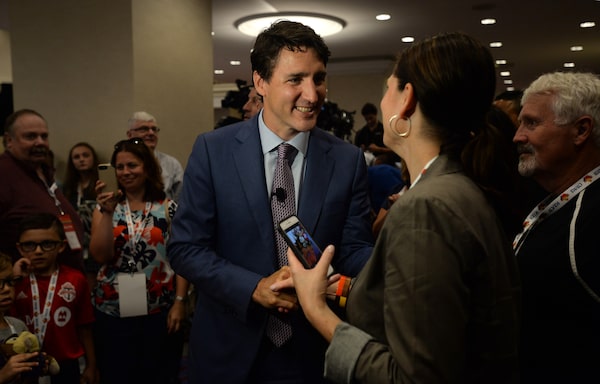
Prime Minister Justin Trudeau greets attendees at the Canadian Teachers’ Federation annual general meeting in Ottawa on July 11, 2019.Adrian Wyld/The Canadian Press
Prime Minister Justin Trudeau acknowledged his government’s imperfect record on progressive issues even as he made a pre-electoral pitch to a pro-union crowd for a second mandate to continue working on files such as poverty, the environment and Indigenous reconciliation.
Speaking to the Canadian Teachers’ Federation (CTF) on Thursday, Mr. Trudeau continued with his current strategy of launching a series of attacks against the Conservative Party of Andrew Scheer and right-wing provincial governments across the country.
However, he also addressed left-wing voters who may be disappointed or angry over his government’s failure to enact electoral reform, the ouster from caucus of Jody Wilson-Raybould and Jane Philpott, or the approval of the Trans Mountain pipeline expansion project.
“For every piece of bad news and things where there is more to do, there’s lots of things we have done,” said Mr. Trudeau, a former teacher himself. “It’s very tempting in politics to focus on the negative. And certainly, I’m more than willing to admit that like any good teacher, I’ve made mistakes and I have learned a lot through this process. But we’re on a path of making Canada better for everyone.”
Mr. Trudeau faced much criticism earlier this year when he refused to apologize for the SNC-Lavalin affair, which led to the departure from his cabinet and subsequently from the Liberal caucus of Ms. Wilson-Raybould and Ms. Philpott.
His statement on Thursday suggested the Liberals are trying to address the criticism coming their way from progressive circles, hoping that enough left-wing voters are willing to forgive past mistakes if it can stop a return to power for the Conservatives.
Mr. Trudeau told the crowd that he wants to “do more” on the environment, reconciliation with Indigenous people and the fight against poverty, adding the country has “moved in the right direction; we need to continue to move in that right direction.” He went on to warn that the alternative to a Liberal government would be a return to the Conservatives.
“The danger … is if, after getting conservative governments across the provinces, that suddenly we have a Conservative government in Ottawa that completely flips around and starts taking us back on the progress we have made,” he said to applause. “Very few Canadians want that.”
Mr. Trudeau continued to raise fears about the decisions that could be made by the Conservatives, suggesting at one point they could roll back the Canada Child Benefit if they win the next election. Conservative spokesman Daniel Schow later responded that it is “shameful that the Prime Minister would deliberately mislead Canadians,” pointing out that Mr. Scheer has publicly promised to preserve the tax-free payments to parents.
NDP Leader Jagmeet Singh addressed the CTF meeting earlier on Thursday, pointing out how publicly funded services have played an essential role in his life, from his schooling as a child of immigrants to the health services for his father who suffered from alcoholism.
After the speech, Mr. Singh told reporters that there’s a stark contrast between the progressive policies of his party and those of the Liberal Party, which he accused of failing Canadians by prioritizing the needs of big corporations.
“The main contrast is, the Liberals have shown they can talk a good talk, but they haven’t actually delivered on changes that people need,” he said.
Mr. Singh also said the government has failed on the environment, pointing to the Trans Mountain pipeline purchase and the Liberals’ continued subsidies in the fossil-fuel sector despite campaigning to end them in 2015.
“That is not a track record where they’re actually defending the environment,” he said.
In contrast, he said the NDP remains opposed to new pipelines and plans to replace fossil-fuel subsidies with investments in renewable energy. Later in the day, Mr. Singh announced the NDP’s national cycling strategy as a plan to reduce greenhouse gas emissions and combat climate change.
The strategy would fund active infrastructure to encourage Canadians to bike to work, he said, adding that many commuters choose to drive because bikes lanes are unsafe. Mr. Singh said bikes lanes should be modelled on those in Copenhagen and Amsterdam and be fully separated from roads and traffic.
While Mr. Singh did not commit to a funding amount, he said the strategy would need to be executed in consultation with provincial and municipal governments.